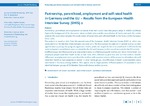Partnership, parenthood, employment and self-rated health
in Germany and the EU – Results from the European Health
Interview Survey (EHIS) 2
Robert Koch-Institut
Partnership, parenthood and employment constitute three main social roles that people adopt in middle adulthood.
Against the background of the discussion about multiple roles and the reconciliation of family and work, this article
analyses the association between the combination of social roles and self-rated health in Germany and the European
Union (EU).
The analysis is based on data from the second wave of the European Health Interview Survey (EHIS 2), which was
conducted in all EU Member States between 2013 and 2015. The final sample included 62,111 women and 50,719 men
aged between 25 and 59. Using logistic regression models, predictive margins for fair to very bad health in different family
and employment constellations were calculated for the EU and Germany (in the case of men only for the EU in total).
A difference was identified according to employment status in all family groups for women and men at the EU level: nonemployed
people rated their health as fair or bad more often, followed by part-time and full-time workers. Smaller
differences by employment status were found for mothers with a partner in terms of the proportion of mothers who selfrated
their health as bad compared to women in other family groups. No differences in health by employment status
were found in Germany among mothers. This applies also to single parents. Different patterns of associations were
identified between groups of EU Member States with diverse welfare systems.
Dateien zu dieser Publikation

